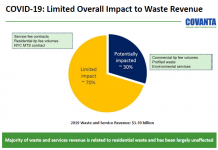The International Monetary Fund released its Spring 2007 World Economic Forecast today. Fuel Vs. Food There is a short sub-section in Appendix 1.1 (“Recent Developments in Commodity Markets”) that I thought might be worth sharing with you. If you download the PDF version of the report and scroll down to page 44, you will find the said sub-section under the heading “Food and Biofuels”. In it, the IMF notes that food prices (as measured by its own food price index) rose by 10% in 2006, driven partly by a poor wheat crop in certain countries but also by (mandated) demand for biofuels in the US and Europe (see graph below).  The report notes that, looking ahead, the prices of crops like corn and soybeans, which are the main feedstocks for ethanol (US) and biodiesel (Europe), respectively, should: (a) continue to rise and (b) begin moving in line with the price of crude oil, which is currently the case with sugar because of its role in the Brazilian ethanol industry. About the recent news that US farmers are planning to plant more corn acreage next year, the IMF has this to say: “For 2007, the United States Department of Agriculture is estimating a record corn crop, as planting areas increase by 10 percent from 2006 at the expense of soybeans and cotton. Still, demand fueled by the increase in domestic ethanol production capacity is expected to outpace the production rise.” IMF economists also point out that the price of “partial substitutes” such as wheat and rice, as well as the price of meat and poultry, should trend upwards as a result of higher corn and soybean prices. Finally, high crude prices could place further upwards pressure on the price of corn because corn farming in the US is highly energy intensive. The IMF – Not Especially Bullish on Corn Ethanol It is the sub-section’s final paragraph, in my view, that best captures IMF’s view of current US and European biofuels policy. It reads as follows: “While on a small scale biofuels may be beneficial by supplementing fuel supply, promoting their use to unsustainable levels under current technology is problematic, and long-term prospects for biofuels depend heavily on how quickly and efficiently second-generation substitutes (such as plant waste) can be adopted. Many energy market analysts also question the rationality of large subsidies that benefit farmers more than the environment. While new technology is being developed, a more efficient solution from a global perspective would be to reduce tariffs on imports from developing countries (for example, Brazil) where biofuels production is cheaper and more energy efficient.” This reaffirms some of the contentions that were made on this site in the past: (a) The way the US is proceeding with its approach to ethanol will inevitably place inflationary pressures on domestic and global food prices, which will result in tensions at home and abroad. (b) The main reasons for pursuing ethanol in the manner in which it is being pursued in the US right now are, in order: (a) placate the farming lobby and earn valuable political support in America’s hinterland; (b) placate the wean-America-off-foreign-oil lobby; (c) placate the soft environmentalist lobby; (d) combat climate change…oh, wait a minute…I guess no one’s settled that thorny energy balance question yet, have they? (c) Not letting emerging markets export ethanol tariff-free to the US is bad economically for a lot of people, from poor Brazilians to middle-class Americans (d) Cellulosic ethanol is the only way forward if biofuels are ever to displace oil in a sustainable manner To Conclude… “Old news!”, you might say…well you’re right, except for this: it’s one thing when I or some other insignificant blogger bashes (or celebrates) corn ethanol; it’s quite another when the top economic think-tank in the world tells you that it sees real long-term viability problems with the way that this industry is currently structured. To be sure, it’s not like the IMF dedicated a large amount of space to this issue, and I’m quite certain that most of the economists who participated in producing this report don’t loose sleep over it at night. But the strong terms used in that little sub-section further reinforce what the corn ethanol bears have been saying: enjoy it while it last, because it’s not structured to be sustainable in its current form for much longer…and I’m not talking about environmental sustainability here. DISCLOSURE: The author does not hold a position in any company involved in biofuels
The report notes that, looking ahead, the prices of crops like corn and soybeans, which are the main feedstocks for ethanol (US) and biodiesel (Europe), respectively, should: (a) continue to rise and (b) begin moving in line with the price of crude oil, which is currently the case with sugar because of its role in the Brazilian ethanol industry. About the recent news that US farmers are planning to plant more corn acreage next year, the IMF has this to say: “For 2007, the United States Department of Agriculture is estimating a record corn crop, as planting areas increase by 10 percent from 2006 at the expense of soybeans and cotton. Still, demand fueled by the increase in domestic ethanol production capacity is expected to outpace the production rise.” IMF economists also point out that the price of “partial substitutes” such as wheat and rice, as well as the price of meat and poultry, should trend upwards as a result of higher corn and soybean prices. Finally, high crude prices could place further upwards pressure on the price of corn because corn farming in the US is highly energy intensive. The IMF – Not Especially Bullish on Corn Ethanol It is the sub-section’s final paragraph, in my view, that best captures IMF’s view of current US and European biofuels policy. It reads as follows: “While on a small scale biofuels may be beneficial by supplementing fuel supply, promoting their use to unsustainable levels under current technology is problematic, and long-term prospects for biofuels depend heavily on how quickly and efficiently second-generation substitutes (such as plant waste) can be adopted. Many energy market analysts also question the rationality of large subsidies that benefit farmers more than the environment. While new technology is being developed, a more efficient solution from a global perspective would be to reduce tariffs on imports from developing countries (for example, Brazil) where biofuels production is cheaper and more energy efficient.” This reaffirms some of the contentions that were made on this site in the past: (a) The way the US is proceeding with its approach to ethanol will inevitably place inflationary pressures on domestic and global food prices, which will result in tensions at home and abroad. (b) The main reasons for pursuing ethanol in the manner in which it is being pursued in the US right now are, in order: (a) placate the farming lobby and earn valuable political support in America’s hinterland; (b) placate the wean-America-off-foreign-oil lobby; (c) placate the soft environmentalist lobby; (d) combat climate change…oh, wait a minute…I guess no one’s settled that thorny energy balance question yet, have they? (c) Not letting emerging markets export ethanol tariff-free to the US is bad economically for a lot of people, from poor Brazilians to middle-class Americans (d) Cellulosic ethanol is the only way forward if biofuels are ever to displace oil in a sustainable manner To Conclude… “Old news!”, you might say…well you’re right, except for this: it’s one thing when I or some other insignificant blogger bashes (or celebrates) corn ethanol; it’s quite another when the top economic think-tank in the world tells you that it sees real long-term viability problems with the way that this industry is currently structured. To be sure, it’s not like the IMF dedicated a large amount of space to this issue, and I’m quite certain that most of the economists who participated in producing this report don’t loose sleep over it at night. But the strong terms used in that little sub-section further reinforce what the corn ethanol bears have been saying: enjoy it while it last, because it’s not structured to be sustainable in its current form for much longer…and I’m not talking about environmental sustainability here. DISCLOSURE: The author does not hold a position in any company involved in biofuels









Old news, yes, but some things bear repetition. In my mind, the real tragedy is that all that extra corn the US is planting will just accelerate the degradation of US farmland… and rising food prices are also accelerating the destruction of rainforest for farms.
Yes, the rainforest clearing problem in Malaysia and Indonesia is also creating a backlash against biodiesel, which is in greater use in Europe than in the US (http://www.commondreams.org/headlines07/0322-01.htm).
The environmental footprint of the agricultural products-based biofuels industry is one of its main weaknesses, and I don’t believe it will be too much longer before the bulk of the environmental movement turns squarely against it.